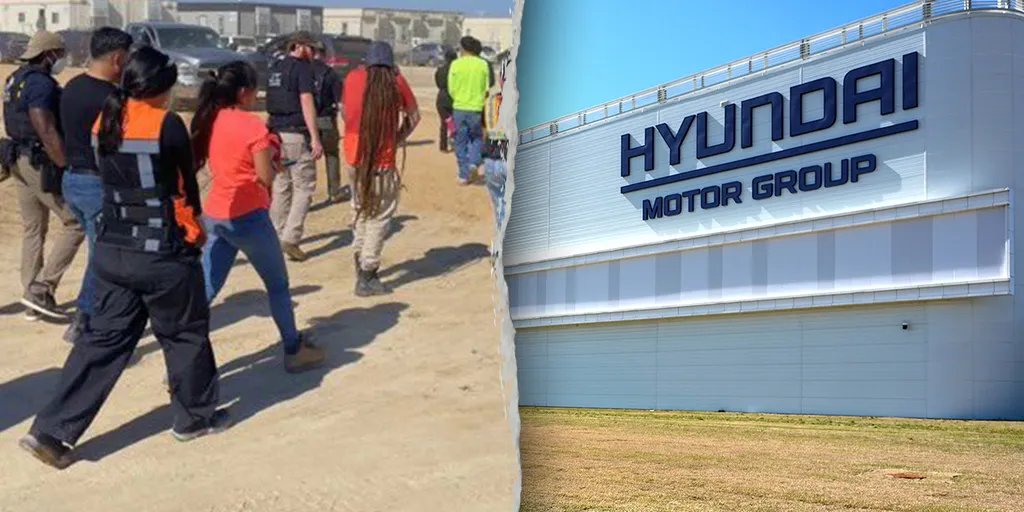What was supposed to be another busy day at Hyundai’s massive electric vehicle factory in Georgia turned into chaos when Homeland Security carried out the largest workplace raid in its history.
Nearly half of the plant’s workforce was swept up in the operation, leaving production at a standstill and sparking both political and diplomatic backlash.
Hundreds of Workers Rounded Up
On Thursday, federal agents stormed the factory and ordered workers outside.
Footage showed long lines of employees sitting on the grass as masked officers kept watch.
Authorities later confirmed that 475 people suspected of working illegally in the U.S. were detained—many of them from South Korea.
With the plant employing about 1,200 workers in total, the arrests represented almost half of the entire staff.
Who Was Detained and Why
Investigators revealed that some of those taken into custody had crossed into the U.S. without authorization, while others had once held visas but overstayed their work permits.
Steven Schrank, the Homeland Security Investigations lead agent in Georgia, said the raid followed months of investigation.
He emphasized that no criminal charges had been filed yet, but described the action as the single largest enforcement sweep Homeland Security had ever carried out at one location.
Officials Defend the Operation
Schrank explained that the raid was about protecting American jobs and ensuring fair competition.
According to him, businesses that follow the rules should not be undermined by companies relying on unauthorized labor.
He added that the goal was also to protect immigrant workers themselves from exploitation.
A Bigger Political Picture
This massive raid didn’t happen in isolation.
Just days earlier, the Trump administration announced it would step up deportations and remove protections for about 256,000 Venezuelans living in the U.S.
The Hyundai arrests seemed to highlight the government’s broader push on immigration enforcement.
South Korea Pushes Back
The news quickly drew a response from South Korea’s Foreign Ministry, which sent officials to Georgia and demanded assurances from the U.S. Embassy in Seoul.
The ministry insisted that Korean citizens’ rights must be protected and warned that business interests of Korean companies should not be unfairly harmed by U.S. enforcement actions.
What Happens to the Detainees
After the raid, authorities confirmed that the arrested workers would be transferred to an ICE facility in Folkston, Georgia, near the Florida border.
Their next steps, Schrank said, would depend on each individual’s immigration circumstances.
Strong Criticism From Labor Leaders
The operation was condemned by Yvonne Brooks, president of Georgia’s AFL-CIO, who called the raid “politically motivated.”
She argued that targeting workers only creates fear, disrupts families, and burdens the remaining employees who have to cover for their detained colleagues.
In her words, the campaign of raids has been less about justice and more about intimidation.
A Blow to a Billion-Dollar Project
The factory itself, a $7.6 billion investment, had been celebrated as one of Georgia’s most important economic developments.
It only began rolling out electric vehicles a year ago, but the sweeping arrests brought work to an abrupt halt.
With half its workforce now gone, the future of production at the site remains uncertain.
What’s Next?
For now, detainees await processing at ICE facilities, while Hyundai and Georgia officials grapple with the fallout.
The raid has already ignited political debates, strained U.S.–Korea relations, and raised questions about how immigration enforcement might impact major foreign investments in America.
One thing is certain: the ripple effects of this historic raid are far from over.
